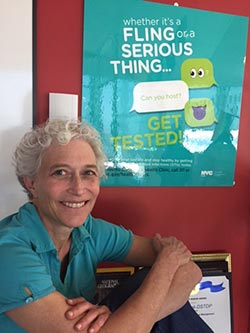A Career in Advocacy and Epidemiology
When Susan Blank ’83 was a student at MIT, the seminal book on women’s health and sexuality, Our Bodies, Ourselves, was a best seller. First published in 1970, the book wasn’t quite as big then as it is today—literally. “I remember it being a little more than a pamphlet when I was a student at MIT,” Blank recalls. “It was great, but it was not enough. I felt bereft of information for women,” she says. Now over 40 years later, Blank is a contributing editor for the most recent edition of the book on women’s reproductive health and sexuality.
Blank became a contributor to Our Bodies, Ourselves as the result of her long history of work in sexual health and disease prevention—a history that began as an MIT undergrad searching for a major. “I just really wanted to find something that I had the capacity to do well and to grow in,” she remembers.
Blank eventually found that fit with biology and an eye on medical school—a plan that didn’t please some at MIT. “I had professors tell me that I had the best engineering training in the world and questioned why I was going to med school,” Blank laughs. Still, Blank enrolled in medical school and during her pediatric residency, developed an interest in epidemiology. “I knew that whatever I contributed in my career would have the goal to make the world a better place,” she says.
After medical school, Blank began work at U.S. Centers for Disease Control’s Epidemic Intelligence Service and was later assigned to New York City’s Bureau of Sexually Transmitted Disease Control where she focuses on stemming rises of sexually transmitted infections (STI) rates throughout the city. “In medicine, you get trained to treat a patient, in my role, you treat a population,” she says.
Blank’s role at the bureau ranges from monitoring the burden and investigating causes of citywide upticks in STI diagnoses to overseeing NYC’s Sexual Health Clinics, to assuring that sex partners of infected persons are treated in order to interrupt disease transmission. Blank, who has been in the role for more than 20 years, has had to adapt to trends to connect with New Yorkers. For example, when STI rates in the city recently ticked up, Blank’s department launched an STI testing advertising campaignwith the help of emojis. “It’s the talk that causes the uncomfortable giggle, but the more we do it, the better people will feel about having discussions that are really important to their health,” Blank told the New York Daily News.
In her work, Blank has focused on myriad issues, notably working on CDC response teams in New York City following September 11, in Haiti following the 2010 earthquake, and Guinea after the 2014 Ebola outbreak. Personally, the issues Blank is passionate about have evolved over the years, citing an increasing involvement with women’s advocacy starting with her contribution to Our Bodies, Ourselves. “Through the course of my career in the control and prevention of STIs, much of the attention has been on men. I wanted to do more to impact women’s health and reproductive justice,” Blank says. In that effort, Blank reconnected with a childhood friend working in women’s health advocacy who happened to be updating Our Bodies, Ourselves. Thanks to her breadth of knowledge on this issue, Blank was invited to edit sections of the book on sexual health and STIs.
“As a young woman, Our Bodies, Ourselves acquainted me with that very uncertain dimension of myself…it introduced me to the advocacy, politics and self-acceptance of who I am as a woman,” she says. “As an older adult, I feel responsible for those coming after me. Contributing to Our Bodies, Ourselves was a very tangible legacy, of which I am proud.”
Hear more from Susan Blank and fellow MIT alumnae at the MIT Women’s unConference, March 9-10, 2018. Save the date or submit your idea for a panel.


